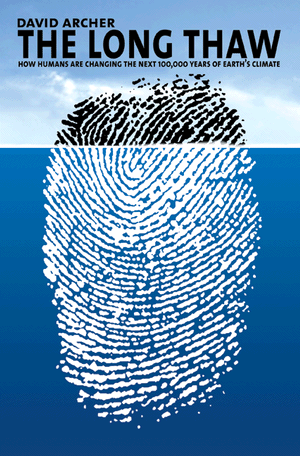
The Long Thaw: How Humans Are Changing the Next 100,000 Years of Earth’s Climate
by David Archer
David Archer understands the limits of human imagination. “I personally can visualize centuries,” he writes. “Sixty years is grandchildren. One hundred is great grandchildren or great, great grandchildren. After that, they’re on their own, am I right?” For us, the present is now, and everything we do, particularly our economic decision-making, focuses on the very near term.
The inability to imagine, much less worry about a distant future makes acting on global warming difficult, Archer acknowledges. In The Long Thaw, a little book with big scope, he aims to make comprehensible huge spans of time, along with the geological, meteorological, and chemical happenings within them. To explain why the current warming is indeed man-made, he contextualizes climate change within the natural processes of the Earth – its long-ago hot and icy times, its more temperate shifts of the last 10,000-odd years, its constantly breathing carbon cycle as it transforms to accommodate our increased output. Remove the human contributors to global warming (which does occur naturally, in part by volcanic eruptions and changes in the intensity of the sun), and the remaining factors simply don’t add up to the observed climate change. And imagining some unknown, new phenomenon, Archer writes, is “a tall order.”
To start, he encourages us to think of the present as this century and the next. He reminds that human memory is approaching a suitably long time span for thinking geologically: if we’re familiar with the Mesopotamians, then we may be remembered millennia from now as well, and perhaps unfavorably if we fail to act on global warming: “Ancient economists might have assured us,” he says, “that the proper course should be to skimp on clean-up, and invest the money instead. Get rich and deal with it.”
The consequences of listening to modern leaders who want us to skimp on curbing climate change, Archer argues, would be a less hospitable world. We would suffer more hurricanes, more drought, more severe rains, and a loss of about 10% of the planet’s carrying capacity. Extended bad weather can have real consequences: “When a complex, ordered society suddenly finds itself with more people than the landscape can support, because of prolonged drought for example, the society tends to fall apart catastrophically,” he writes.
The worst case scenario of global warming would return the Earth to a “hothouse” environment, unseen for tens of millions of years, with sea levels that could rise by 70 meters. Ten percent of the carbon dioxide we’re releasing from coal right now will still be hovering around the earth in 100,000 years, affecting its climate, as the Earth attempts to process it. And our huge release of carbon dioxide, which has the power to push back the next ice age, means that the Earth’s “natural cooling…is unlikely to save us from global warming.” Humans, as brief as our history on Earth may be, have become “major players in geologic time.”
What will save us? Archer makes passing reference to fuel efficient cars and the like, and details bigger, science-fictional seeming options, like adding sulfur to airplane fuel and lodging a giant mirror in space. But the best method, he writes, is simply to release less carbon, and the best way to do it isn’t on the basis of economics, which isn’t motivating a quick enough move to renewable energy, since we still have a few centuries’ worth of fossil fuels remaining. For Archer, it is a matter of ethics alone.
Excerpt: The Intergovernmental Panel on Climate Change “forecast for climate change in the coming century is for a generally smooth increase in temperature, changes in rainfall, sea level, and so forth. However, actual climate changes in the past have tended to be abrupt…. Human civilization arose during a time interval, the Holocene, that was the most stable climate interval in 650 millennia…. The impact of a severe sudden rearrangement of the landscape of the Earth on our society today is frightening to imagine, all the more so if it happened within a few years, rather than over the course of a few centuries.”
Further Reading: The Long Summer: How Climate Changed Civilization and Global Warming: Understanding the Forecast




Send A Letter To the Editors